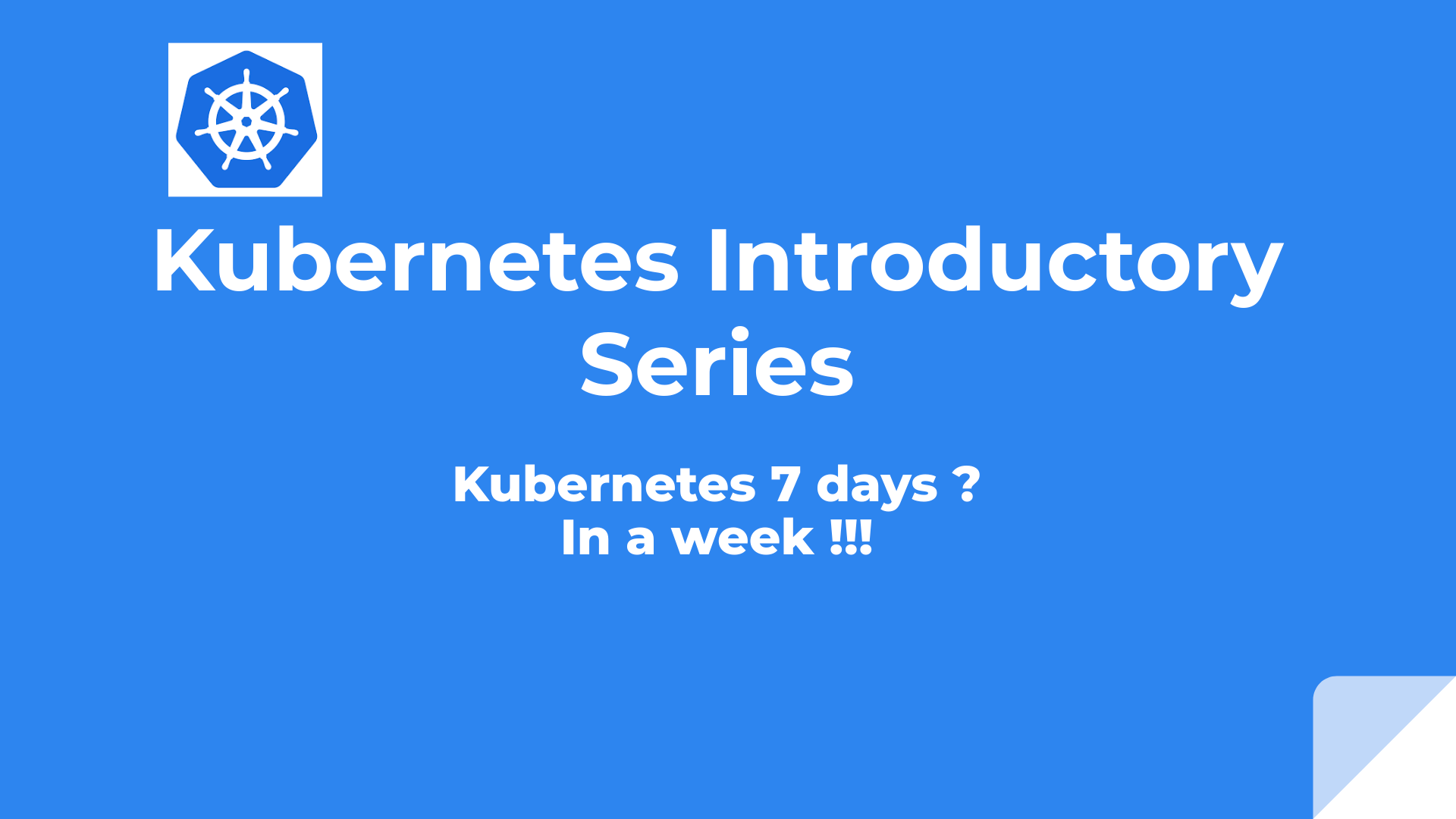Create a Pod
It covered in the previous series. We will look into it from a different angle. We will use the pod definition file created in the previous module and create a pod.
If you do not have any previous experience on the pod, have a look at the previous seriesKubernetes in 7 days? In a week !!! and come back here.Click here
rajith@k8s-master:~$ vi my-first-pod.yaml
rajith@k8s-master:~$ cat my-first-pod.yaml
apiVersion: v1
kind: Pod
metadata:
name: my-first-pod
labels:
type : web
env : prod
spec:
# The container specification section starts here
containers:
- name: my-first-pod
image: nginx
# The container specification section ends here
rajith@k8s-master:~$ kubectl create -f my-first-pod.yaml
pod/my-first-pod created
rajith@k8s-master:~$ kubectl get pods
NAME READY STATUS RESTARTS AGE
my-first-pod 0/1 ContainerCreating 0 5s
rajith@k8s-master:~$ kubectl get pods
NAME READY STATUS RESTARTS AGE
my-first-pod 0/1 ContainerCreating 0 8s
rajith@k8s-master:~$
It is containerising. How will we check the details of it? I mean, to see what is happening in the background. 🤔
rajith@k8s-master:~$ kubectl describe pod my-first-pod
Name: my-first-pod
Namespace: default
Priority: 0
Node: node-3/192.168.50.13
Start Time: Mon, 05 Jul 2021 16:09:50 +0000
Labels: env=prod
type=web
Annotations: <none>
Status: Running
IP: 10.32.0.2
IPs:
IP: 10.32.0.2
Containers:
my-first-pod:
Container ID: docker://3134b4d480414366cccdb9baa208d0eb618124bdb92c13e2f715b335510f61d9
Image: nginx
Image ID: docker-pullable://nginx@sha256:47ae43cdfc7064d28800bc42e79a429540c7c80168e8c8952778c0d5af1c09db
Port: <none>
Host Port: <none>
State: Running
Started: Mon, 05 Jul 2021 16:10:00 +0000
Ready: True
Restart Count: 0
Environment: <none>
Mounts:
/var/run/secrets/kubernetes.io/serviceaccount from kube-api-access-d7gtz (ro)
Conditions:
Type Status
Initialized True
Ready True
ContainersReady True
PodScheduled True
Volumes:
kube-api-access-d7gtz:
Type: Projected (a volume that contains injected data from multiple sources)
TokenExpirationSeconds: 3607
ConfigMapName: kube-root-ca.crt
ConfigMapOptional: <nil>
DownwardAPI: true
QoS Class: BestEffort
Node-Selectors: <none>
Tolerations: node.kubernetes.io/not-ready:NoExecute op=Exists for 300s
node.kubernetes.io/unreachable:NoExecute op=Exists for 300s
Events:
Type Reason Age From Message
---- ------ ---- ---- -------
Normal Scheduled 18s default-scheduler Successfully assigned default/my-first-pod to node-3
Normal Pulling 17s kubelet Pulling image "nginx"
Normal Pulled 8s kubelet Successfully pulled image "nginx" in 8.907628369s
Normal Created 8s kubelet Created container my-first-pod
Normal Started 8s kubelet Started container my-first-pod
rajith@k8s-master:~$
Yes, the command kubectl describe pod my-first-pod give the details of it.
We will break it down further.
The first section containes the metadata information of the pod.
Name: my-first-pod
Namespace: default
Priority: 0
Node: node-3/192.168.50.13
Start Time: Mon, 05 Jul 2021 16:09:50 +0000
Labels: env=prod
type=web
Annotations: <none>
Status: Running
IP: 10.32.0.2
IPs:
IP: 10.32.0.2
Containers:
my-first-pod:
Container ID: docker://3134b4d480414366cccdb9baa208d0eb618124bdb92c13e2f715b335510f61d9
Image: nginx
Image ID: docker-pullable://nginx@sha256:47ae43cdfc7064d28800bc42e79a429540c7c80168e8c8952778c0d5af1c09db
Port: <none>
Host Port: <none>
State: Running
Started: Mon, 05 Jul 2021 16:10:00 +0000
Ready: True
Restart Count: 0
Environment: <none>
Mounts:
/var/run/secrets/kubernetes.io/serviceaccount from kube-api-access-d7gtz (ro)
Next, it talks about the container details inside the pod. You can see the container name, container ID, image used, Image ID, etc in it.
Conditions:
Type Status
Initialized True
Ready True
ContainersReady True
PodScheduled True
Now it talks about the condition of the pod, hopes it is self-explanatory.
Volumes:
kube-api-access-d7gtz:
Type: Projected (a volume that contains injected data from multiple sources)
TokenExpirationSeconds: 3607
ConfigMapName: kube-root-ca.crt
ConfigMapOptional: <nil>
DownwardAPI: true
QoS Class: BestEffort
Node-Selectors: <none>
Tolerations: node.kubernetes.io/not-ready:NoExecute op=Exists for 300s
node.kubernetes.io/unreachable:NoExecute op=Exists for 300s
It is about the volume information. If we mount any persistent volume, it shows here. Then about Toleration, Node-Selectors those are a completely different topic we will talk about it later.
Events:
Type Reason Age From Message
---- ------ ---- ---- -------
Normal Scheduled 18s default-scheduler Successfully assigned default/my-first-pod to node-3
Normal Pulling 17s kubelet Pulling image "nginx"
Normal Pulled 8s kubelet Successfully pulled image "nginx" in 8.907628369s
Normal Created 8s kubelet Created container my-first-pod
Normal Started 8s kubelet Started container my-first-pod
Now it is about the event, the actual part which we thought of discussing here.
In the event, the first line talks about pod scheduling.
- It used the ‘default scheduler to schedule the pod. We discussed scheduler in our first series, control plane components.
- It says it assigned to node-3. How do verify? Yes, we knew that.
rajith@k8s-master:~$ kubectl get pod -o wide
NAME READY STATUS RESTARTS AGE IP NODE NOMINATED NODE READINESS GATES
my-first-pod 1/1 Running 0 96m 10.32.0.2 node-3 <none> <none>
rajith@k8s-master:~$
It assigned to node-3.
Normal Pulling 17s kubelet Pulling image "nginx"
Normal Pulled 8s kubelet Successfully pulled image "nginx" in 8.907628369s
The next two lines say it is pulling the image “Nginx” from the docker repository. It took 8s to pull the image.
Normal Created 8s kubelet Created container my-first-pod
Normal Started 8s kubelet Started container my-first-pod
And the last two line says it created the pod named ‘my-first-pod’, it is started.
That’s it, initially by looking at the big output we thought it is rocket science. It is as simple as that of our first standard textbook.
